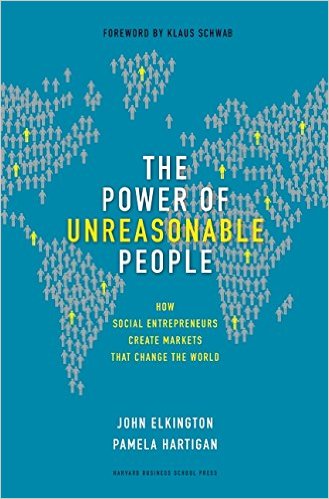This is the second part of an article I started quite a while ago on Positive Business DC. Click here for the first part.
 What are some examples of social entrepreneurs and the context which has helped cultivate those strengths?
What are some examples of social entrepreneurs and the context which has helped cultivate those strengths?
Cristóbal Colón, a Spaniard, studied psychiatry and was put in charge of a work therapy program at a hospital. His job involved assigning the patients useless task to keep them occupied like making ceramic ashtrays. Colón grew frustrated and knew that these people were not unintelligent and that they needed to feel worthwhile. Colón set up a dairy business in Cataluña called La Fageda and was able to persuade a loan officer to grant him the seed money in order to do so. Today La Fageda has the third largest market share for yogurt (behind only Dannon and Nestlé). It still employs the mentally ill and is fully self-sustaining. Although it is equipped with a mental health facility onsite, the mentally ill are no longer viewed as “patients” but as workers who earn their living at one of their country’s leading dairy companies. Clearly, Colón cultivated his strength of fairness while working in a psychiatric hospital as well as persistence and appreciation of beauty and excellence thereby creating a self-sustaining model that will continue to help the disadvantaged of Spain.
In the United States, Gillian Caldwell has been fighting social injustice since the early 1990s. After being deeply affected by a painting of a CIA mercenary abusing a political prisoner that she saw as a young child, she decided to dedicate her life to curbing social injustice. As the executive director of Witness, a hybrid nonprofit organization in New York City, she helps others film “shocking examples of human rights abuse” (Elkington & Hartigan, 2008, p. 151). Her efforts have resulted in a documentary called Bought & Sold about Russian sex trafficking that caused President Clinton to allocate $10 million to fight violence against women. It is her fairness, social intelligence, bravery, persistence, authenticity and hope that have enabled her to be so successful in empowering others. She does not believe that she is unique: “Each and every one of us has the power to change the world, if we believe we can and have the right tools at our disposal.”
I would argue that the tools needed are not video cameras with the highest definition or classes on filmography. Rather, the tools we need to change the world are love and open-mindedness and leadership and kindness. Peterson and Seligman state that “the display of a strength by one person does not diminish other people in the vicinity” (p. 21, 2004). Therefore, we can read books such as this instead of being discouraged by the comparison, we can experience awe and inspiration at a group of people so vital and thriving. Then, encouraged and empowered, we can change the world in whatever way we choose.
References:
Elkington, J. & Hartigan, P. (2008). The Power of Unreasonable People: How social entrepreneurs create markets that change the world. Harvard University Press: Boston.
McCullough, M. E., & Snyder, C. R. (2000). Classical sources of human strength: Revisiting an old home and building a new one. Journal of Social and Clinical Psychology, 19, 1-10.
Peterson, C., & Seligman, M. E. P. (2004). Character strengths and virtues: A handbook and classification. Oxford: New York.
